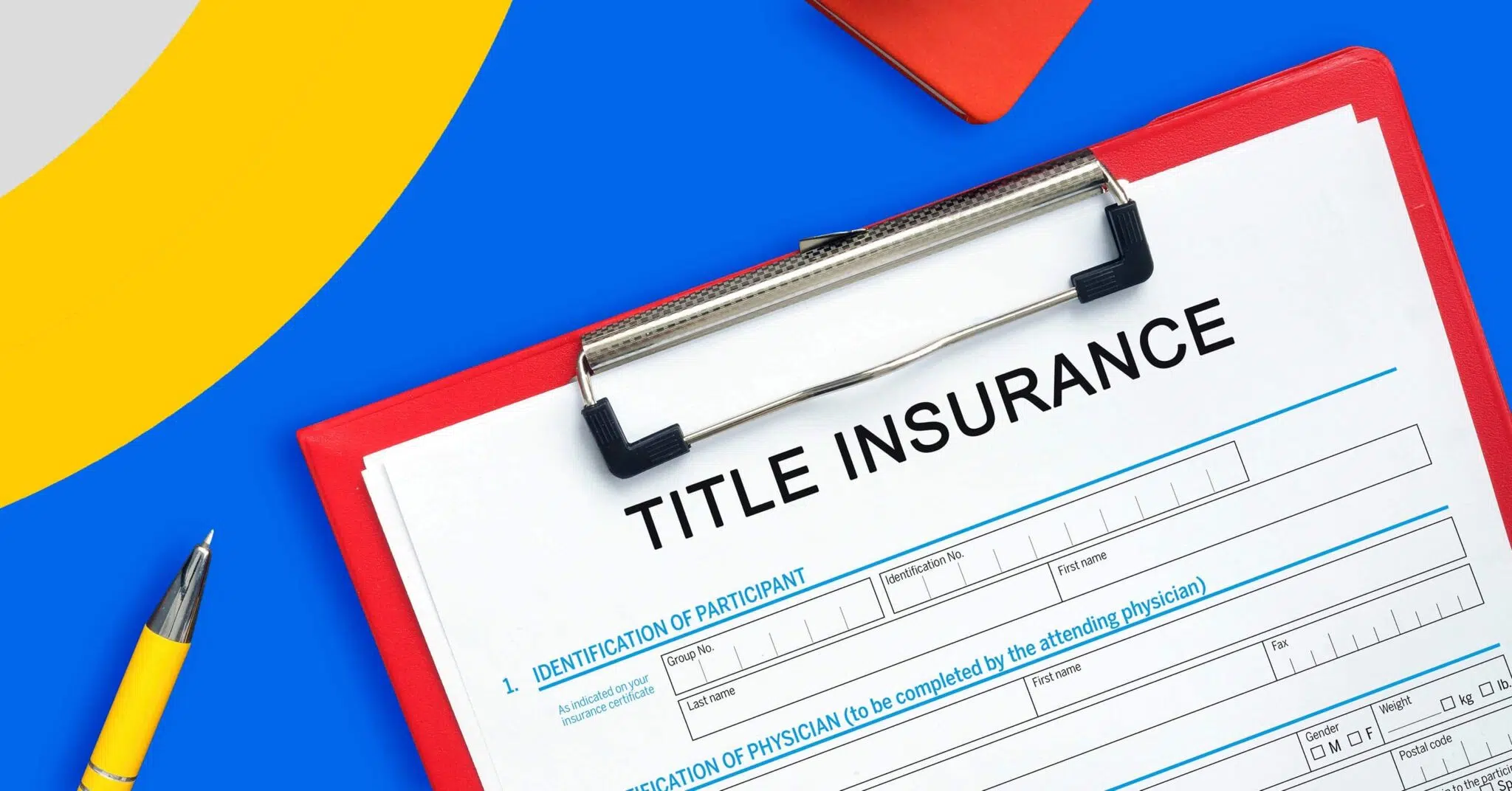Title Insurance: What is it and What Does it Cover?

Table of contents
When purchasing a property, it’s vital to ensure that you have a free and clear title. Purchasing title insurance is an important step that helps protect you as a homebuyer or existing homeowner against problems that can lead to significant financial losses and legal disputes.
What is title insurance? Title insurance is an insurance policy that protects residential property owners and lenders against any losses related to the property’s title or ownership.
Read on to learn more about title insurance, what it covers, and how it can help you protect your biggest investment.
Key Takeaways
- Title insurance safeguards property owners and lenders against potential losses or damages arising from title defects, liens, errors, and fraud.
- There are two types of title insurance policies: the lender’s policy, which protects the lender, and the owner’s policy, which protects the property owner.
- While title insurance is not mandatory, it is highly recommended to ensure peace of mind and financial protection in case of unforeseen title-related issues.
What Does “Title” Mean?
The word title is a legal term, and in the context of property ownership, it means the right of ownership over a piece of land or property. When you purchase a property, you acquire the title to that property, which is then recorded in the government’s land registration system.
However, it’s important to note that the title may not always be free and clear of any encumbrances or defects. For example, in some cases, previously unpaid property taxes or a previous owner disagreeing with a contractor, resulting in a lien being placed on the property, could result in the full title not being free and clear.
What Is Title Insurance?
Title insurance is a form of protection that provides coverage against potential risks and issues associated with the property’s title. It offers financial protection to property owners and lenders in the event of damages or losses arising from liens, errors, title defects, or fraud.
Unlike other forms of insurance which protect against future events, title insurance primarily focuses on past events that may affect the property’s title.
Title Insurance Protects You From:
- Liens: A lien is a legal claim against the property by a creditor or lender to secure unpaid debts. The property could be subject to a lien if the previous owner failed to satisfy their financial obligations, such as unpaid taxes, mortgages, or contractor invoices.
- Errors: Misspelled names or a previous owner who hasn’t been fully discharged are just a few mistakes during the registration or documentation process that could create disputes and cloud the title.
- Title Defects: Title defects are issues that affect the property’s ownership rights and may not be apparent at the time of purchase. These defects include undisclosed easements, boundary disputes, or unresolved zoning violations.
- Fraud: Title fraud is a growing concern in the real estate industry. It occurs when someone impersonates the property owner, forges documents, obtains a mortgage, or fraudulently transfers the property’s title and sells the property.
Who Issues Title Insurance?
A title insurance company issues a title insurance policy. These companies assume the risks associated with the property’s title and provide coverage for the specific risks outlined in the policy. The cost for title insurance is called a premium and is a one-time cost typically obtained when closing on a property, though it can be purchased after you’ve become a homeowner.
Title vs Deed: What’s the Difference?
In simple terms, a title is a term used to refer to ownership rights, while a deed is a document that transfers those rights from one party to another. If you’re purchasing a home, a deed will transfer the property’s title from one party (the seller or transferor) to another (the buyer or transferee), acting as proof of ownership. This transaction is executed during the sale or transfer of the property.
Mortgage payment plans aren’t meant to be one-size-fits-all.
Chat with a nesto mortgage expert & get a mortgage payment fit to you.
Do I Really Need Title Insurance?
Title insurance is optional and isn’t a requirement across Canada. However, it is recommended to help protect you as both a homebuyer and an existing homeowner. The decision to purchase title insurance should be discussed with your real estate lawyer, title insurance company, or insurance agent/broker to fully understand the protection title insurance can provide.
Important: Title insurance doesn’t replace legal advice when purchasing property.
Here are just a few reasons why title insurance is worth considering:
Protection Against Financial Losses
Title insurance provides financial protection in case of title-related issues, such as liens, errors, defects, or fraud. It ensures that you won’t be responsible for any outstanding debts or legal disputes that may arise.
Peace of Mind
By obtaining title insurance, you have peace of mind knowing that your investment is adequately protected. It eliminates the uncertainty and potential risks associated with the property’s title.
Cost-Effective
Considering the potential financial consequences of title-related issues, title insurance is relatively affordable. It is a one-time premium providing protection for as long as you own the property.
What Does Title Insurance Cover?
Title insurance policies come in two main forms: lender’s and owner’s policies. Let’s explore each policy and what they cover:
Lender’s Policy: Most lenders require this mandatory policy that homebuyers must purchase. This type of policy protects the lender’s interest in the property and protects them from losses if the mortgage is invalid or unenforceable. The lender’s policy covers the lender’s investment up to the mortgage amount.
Owner’s Policy: While the lender’s policy protects the lender, the owner’s policy provides coverage for the property owner. This policy is optional but highly recommended to protect your investment. The owner’s policy covers the property owner for the duration of their ownership and can even be passed on to their heirs.
Both policies protect each party against:
- Existing liens (unpaid debts or taxes from the previous owner) or encumbrances (mortgages) on the property’s title
- Undisclosed title defects that impact your ownership of the property
- Title Fraud
- Encroachment issues (like a structure on your property that encroaches on a neighbour’s property)
- Errors in public records or surveys
- Additional title-related issues that could affect your ability to sell, mortgage, or lease the property in the future.
Common Exclusions
While title insurance provides comprehensive coverage, some exclusions may apply. These exclusions can vary depending on the policy, so it’s important to always read and understand your policy and ask any questions to fully understand your coverage.
Title insurance exclusions:
- Title defects or issues that were known or disclosed before purchasing the policy
- Indigenous land claims
- Environmental hazards
- Matters not listed in public records (unrecorded liens or encroachments)
- Zoning and bylaw violations due to changes, renovations or additions to the property or land
Non-title related exclusions:
- Natural disasters (fires, floods, etc.)
- Wear and tear of the property
- Burglary and theft
- Other issues that are not title-related
What Is Title Fraud?
Title fraud is a form of real estate fraud that involves someone unlawfully assuming the property owner’s identity through stolen personal information or forged documents and transferring the property’s title to themselves without the real owner’s knowledge or consent. The fraudster then uses the title to secure a mortgage on your home, use the equity, or sell the home and disappear with the proceeds.
What Types of Property Can be Insured?
This insurance can be purchased for both residential and commercial properties.
Residential title insurance policies can insure
- Houses
- Condos
- Cottages
- Rental units
- Cooperatives
- Leased properties
- Rural properties
- Vacant land
Commercial title insurance policies can insure
- Apartment buildings
- Office buildings
- Industrial buildings
- Shopping centres
- Rental units
- Warehouses
- Vacant commercial land
- Leased commercial properties
- Hotels
What Is Residential Title Insurance?
Residential title insurance covers risks commonly associated with residential real estate transactions. Whether you’re buying a home or condo or already own one, you may want to consider purchasing residential title insurance to protect your property.
Residential title insurance provides:
- Comprehensive coverage – Protects against losses related to the property’s title. It may also provide coverage for your lawyer’s negligence or errors relating to title risks covered by your policy.
- Gap coverage – This insures you for the “gap” between the time your property purchase is finalized (closing day) and the time your title is registered in the provincial land registration system.
- Survey coverage This may eliminate the need for a new, up-to-date property survey. Most lenders will accept this as an alternative to a survey or Real Property Report (RPR), saving you time and money.
- Legal coverage – The title insurance company will pay for most legal expenses involved in defending your home’s title.
Frequently Asked Questions
What is title insurance in Canada?
Title insurance is a type of insurance that protects against losses if there are any defects (problems) with the title of your home. For example, if it turns out that the person who sold you the home didn’t actually own it, or if there are outstanding mortgages or liens against the property, title insurance will help to cover your losses.
How much is title insurance?
The answer on how much title insurance costs in Canada depends on several factors, such as the value of the property and the level of coverage you need. However, you can expect to pay between $250 to $400.
How long is title insurance good for?
Title insurance lasts for as long as you own the property. Most policies will also cover your heirs through a will, spouses in the event of a divorce, and children if the parent transfers the property to them.
When do you purchase residential title insurance?
Title insurance can be purchased during closing or anytime if you already own a property.
Where do I purchase title insurance?
Title insurance can be obtained through your real estate lawyer or an insurance broker who will assist you in selecting a reputable title insurance provider. You also have the option to purchase it on your own directly through a title insurance provider.
Final Thoughts
Title insurance protects you from potential risks and issues that arise relating to your property’s title. This prevents you from incurring costs associated with fixing or defending the ownership rights of your property.
While not mandatory, it’s highly recommended to have title insurance in place to safeguard your investment.
If you’re considering purchasing a home, speak with your nesto mortgage expert about the benefits of title insurance.
Ready to get started?
In just a few clicks, you can see our current rates. Then apply for your mortgage online in minutes!















